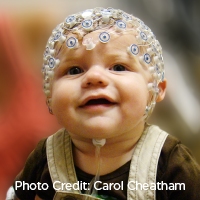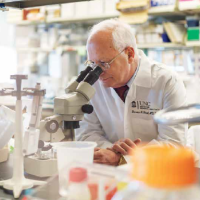steven_zeisel@unc.edu
704-250-5003
Steven H. Zeisel, MD, PhD
Professor Emeritus, Founding Director of the NRI
As the North Carolina Research Campus (NCRC) grows and more scientists and administrators move to Kannapolis, there is one face that has been here since the beginning. Founding NRI Director Steven Zeisel, MD, PhD, was a leader in this innovative venture before the first shovel hit the dirt. From the start, Zeisel was involved in building the dream of the NCRC, including its unique mission, novel approach to research, and distinguished team. Not only has he played an integral role alongside David H. Murdock in developing the vision of the Campus, he has also led the charge to seek scientific synergy between the best minds in nutrition research, through collaboration with the other NCRC organizations.
Under Zeisel’s leadership, this collaboration is the defining hallmark that will revolutionize the field of nutrition worldwide. Zeisel’s passion for the science of nutrition is evident throughout his distinguished career. He initially attended medical school at Harvard and completed his residency in pediatrics at Yale-New Haven Hospital. He earned his PhD in Nutrition from Massachusetts Institute of Technology in 1979.
After rising to the rank of professor at Boston University’s School of Medicine, Zeisel joined UNC-Chapel Hill’s faculty in 1990, becoming professor and chair of the UNC Department of Nutrition (the first department of nutrition in the country in both a school of public health and a medical school). In 1999, he was named Associate Dean of Research for the UNC School of Public Health. Later he began directing UNC’s Clinical Nutrition Research Unit (now called the UNC Nutrition Obesity Research Center). Subsequently, he was named a Kenan Distinguished University Professor of Nutrition & Pediatrics at the UNC Gillings School of Global Public Health and at the UNC School of Medicine in 2005.
Show MoreAs the North Carolina Research Campus (NCRC) grows and more scientists and administrators move to Kannapolis, there is one face that has been here since the beginning. Founding NRI Director Steven Zeisel, MD, PhD, was a leader in this innovative venture before the first shovel hit the dirt. From the start, Zeisel was involved in building the dream of the NCRC, including its unique mission, novel approach to research, and distinguished team. Not only has he played an integral role alongside David H. Murdock in developing the vision of the Campus, he has also led the charge to seek scientific synergy between the best minds in nutrition research, through collaboration with the other NCRC organizations.
Show MoreIn the News
November Faculty Focus: Steven H. Zeisel, PhD
November 13, 2018 – From his lab in a textile mill-turned-food research center, a UNC scientist has brought an important nutrient to the world’s attention. Dr. Steven Zeisel wants to make sure you’re getting enough choline. In a state-of-the-art laboratory on the North Carolina Research Campus, in the unlikeliest of places in a former textile mill town, Zeisel is overseeing scientific experiments about a nutrient that could change the way we eat.
Choline in Human Milk Plays a Crucial Role in Infant Memory
October 3, 2018 – Choline is present in human milk, and is especially important for fetal and infant development [2,3]. “The hint that choline is important for infant development comes from the fact that in human milk, the supply of choline remains constant across the first year of life,” says Professor Carol Cheatham from the University of North Carolina at Chapel Hill. Other important nutrients, such as docosahexaenoic acid (DHA), are present in large quantities initially, but often level off after a few months.
A Chance I Might Discover Something
This article was published originally in July/August 2018 Carolina Alumni Review. July 31, 2018 – From his lab in a textile mill-turned-food research center, a UNC scientist has brought an important nutrient to the world’s attention. Dr. Steven Zeisel wants to make...
Offspring Brain Health Determined by Maternal Diet and Genes
December 12, 2018 – The importance of choline to brain development and function was first demonstrated in the 1980s, but because choline has multiple fates and functions within the body, the question of how choline levels specifically impacted neural development has remained unanswered. In research just published in The FASEB Journal, NRI director Steven Zeisel, MD PhD, and NRI assistant professor Natalia Surzenko, PhD, make a major contribution towards answering this question.
Publications
2020
2019
2018
2017
Contribution of Dietary Supplements to Nutritional Adequacy in Various Adult Age Groups.
Trimethylamine N-Oxide, the Microbiome, and Heart and Kidney Disease.
Reduced brain volume and impaired memory in betaine homocysteine S-methyltransferase knockout mice.
Astronaut ophthalmic syndrome.





